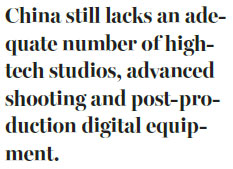Making China into a truly great movie power
By Xiao Chuan ( China Daily Europe )
Updated: 2018-05-18
|
|||||||||
The industrialization of China's film sector was a major topic of discussion at the recent 8th Beijing International Film Festival. Some filmmakers cited the success of Wolf Warrior 2, which amassed a record 5.68 billion yuan ($891 million; 754 million euros; £658 million) at the box office, and Operation Red Sea, which won the Best Visual Effects Award at the Beijing festival, as evidence that China's film industry has come of age.
The construction of the Qingdao Oriental Movie Metropolis in Shandong province might have boosted the filmmakers' optimism. Built on 166 hectares for 50 billion yuan and expected to open in August, the film complex is a comprehensive cultural industry project with a super-large film and television industrial park. It will comprise 52 high-tech studios, including the largest studio and the only fixed underwater studio in the world.
Since the Qingdao film complex will have world-class sound, mixing and animation facilities, as well as costumes, props and equipment processing plants, some believe it will boost the production of mega-scale films and help China's film industry to "go global".
However, some believe China's film industry has a weak foundation, and despite the success of movies such as Wolf Warrior 2 and Operation Red Sea, it still has a long way to go before becoming as influential as Hollywood.
Industrialization of movies is based on specialized mass production of films, large-scale industrial parks, highly efficient engineers and technicians, steady and quick-to-duplicate assembly line production equipment, and a comprehensive industrial chain comprising, among other things, shooting, post-production, distribution and screening facilities.
But China still lacks an adequate number of high-tech studios, advanced shooting and post-production digital equipment. As a result, some Chinese films have to be sent to the United States, Japan and the Republic of Korea for post-production.
To overcome this problem, China needs to combine funding input from enterprises with considerable government support to fully industrialize infrastructure construction and production level.

More important, China should, by providing "one-stop" film and TV drama shooting services, create a standardized film industrialization process and use competitive subsidy policies to reduce shooting and production costs. The public-private partnership model being explored by Qingdao Oriental Movie Metropolis should set an example for other large movie and TV drama production bases. Wanda Group and the Qingdao government contributed 5 billion yuan to the Qingdao film complex as its special film development fund, which offers subsidies of 20 to 40 percent to the films made there.
Qingdao has also set up a special fund to support film and TV drama enterprises that set up base there, offering them a subsidy of up to 10 percent of their business revenues.
In terms of software, China's film industry should try to inculcate in talent and professionals a profound global vision based on Chinese elements. A special symposium at the 8th Beijing International Film Festival took a positive step toward this goal by discussing how to make new directors more efficient and productive, and promote a high-standard industrialized film system through cultivation of talent.
Last year, the Chinese mainland's box office hit 55.9 billion yuan, making it the world's second-largest film market. In the latest round of reform, the establishment of a new film management bureau under the Publicity Department of the Communist Party of China Central Committee highlights the strategic position given to the film industry.
How to tell the world a good Chinese story and project a stronger Chinese voice is a big cultural mission for the country's film industry. For this, China needs to deepen the reform of the entire cultural industry and give full play to the market's invisible hand and the government's visible hand so that the problems associated with the industrialization of the film sector can be solved, and China can become a truly great moviemaking power.
This article was first published in Beijing Youth Daily.
(China Daily European Weekly 05/18/2018 page12)




